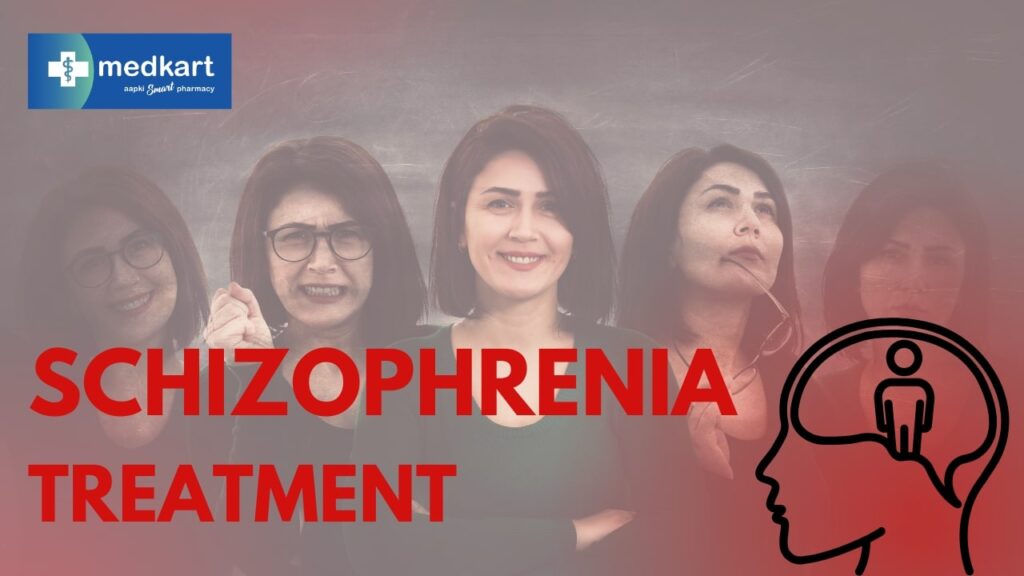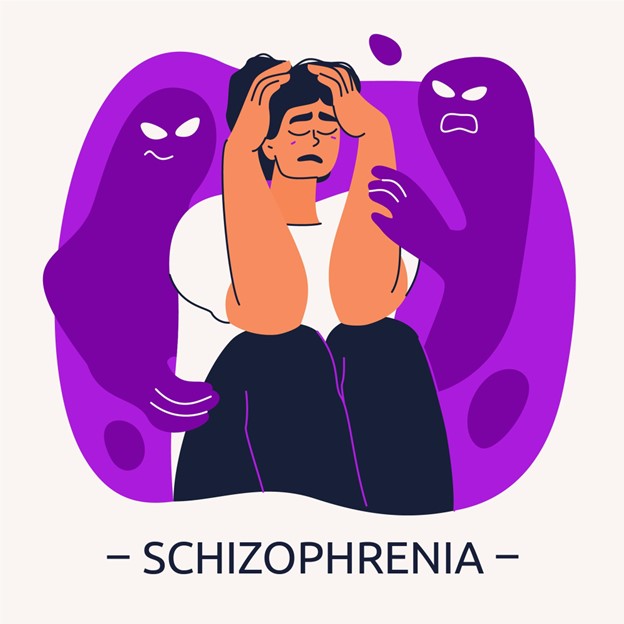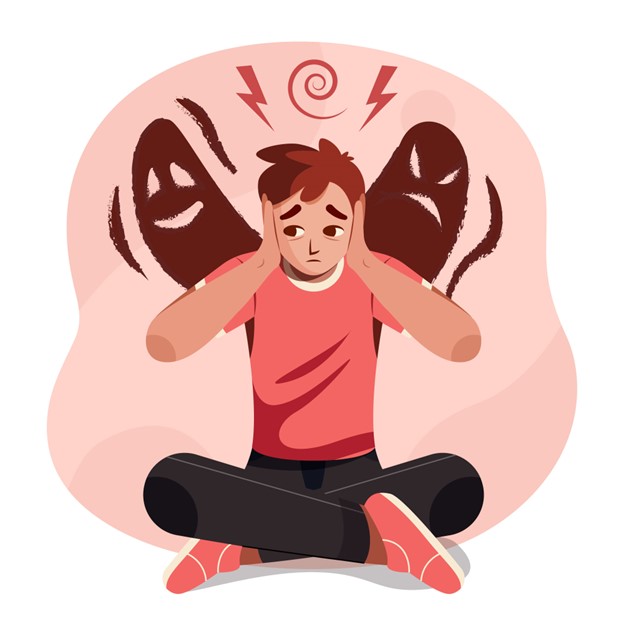Last updated on July 9th, 2025 at 05:20 pm

Schizophrenia treatment typically involves a multifaceted approach aimed at managing symptoms and improving overall well-being. Medication, particularly antipsychotics, is commonly prescribed to address the distorted thinking and hallucinations characteristic of the disorder. Psychotherapy, such as cognitive-behavioral therapy, plays a crucial role in helping individuals cope with and modify negative thought patterns.
Social support is emphasized, involving family, friends, and support groups to provide understanding and encouragement. Lifestyle modifications, including regular exercise, a balanced diet, and adequate sleep, contribute to holistic well-being.
Vocational and educational support programs assist individuals in maintaining employment or pursuing education, fostering a sense of purpose. In acute phases or crises, hospitalization and crisis intervention teams may be necessary. The collaborative effort between individuals, healthcare providers, and support networks is key to tailoring an effective and personalized treatment plan.
Schizophrenia Treatment
Schizophrenia is a complex mental health condition that affects millions of individuals worldwide. Characterized by distorted thinking, hallucinations, and impaired social functioning, schizophrenia requires a multifaceted approach to treatment. While there is no cure for this chronic disorder, advancements in research and understanding have led to various effective strategies to manage symptoms and improve the quality of life for those affected.

Medication
Antipsychotic medications form the cornerstone of schizophrenia treatment. These drugs help manage the symptoms of the disorder, primarily by altering the effects of neurotransmitters in the brain. Individuals with schizophrenia must work closely with their healthcare providers to find the most suitable medication and dosage. Regular monitoring and adjustments may be necessary to minimize side effects and optimize effectiveness.
One commonly prescribed medicine in the management of schizophrenia is Placida Tablet. It helps reduce symptoms such as delusions, aggression, restlessness, and mood disturbances. It may also be used in treating bipolar disorder and other psychotic conditions under medical supervision.
> Consult a Doctor and Medkart will help you Order Medicines Online
Psychotherapy
Therapeutic interventions play a pivotal role in helping individuals with schizophrenia cope with their symptoms and improve their daily functioning. Cognitive-behavioural therapy (CBT) is particularly beneficial, helping individuals identify and change negative thought patterns and behaviours. Other therapeutic approaches, such as family therapy and supportive psychotherapy, can also contribute to a comprehensive treatment plan.

Social Support
Building a strong support system is essential for individuals with schizophrenia. Family, friends, and support groups can provide emotional support, encouragement, and understanding. Social connections contribute to a sense of belonging and reduce feelings of isolation, which are common challenges for those with schizophrenia.
Lifestyle Modifications
A holistic approach to schizophrenia treatment includes lifestyle adjustments that promote overall well-being. Regular exercise, a balanced diet, and sufficient sleep can positively impact both physical and mental health. Substance abuse can exacerbate symptoms, so avoiding drugs and alcohol is crucial. Integrating stress-management techniques, such as mindfulness and relaxation exercises, can also be beneficial.
Vocational and Educational Support
Maintaining employment or pursuing education can be challenging for individuals with schizophrenia, but it is an essential aspect of their overall well-being. Vocational and educational support programs help individuals develop skills, build confidence, and find meaningful activities that contribute to a sense of purpose and achievement.
Hospitalization and Crisis Intervention
In some cases, hospitalization may be necessary during acute phases of schizophrenia or in times of crisis. Crisis intervention teams, often consisting of mental health professionals, can provide immediate assistance and support during challenging situations.
Also, Read:
- Home Remedies for Loose Motion
- Diet Plan For Weight Loss
- How to Remove Tan from Face?
- How to Increase Breast Size?
- Normal Blood Sugar Levels Chart
Paranoid Schizophrenia Treatment
Treatment for paranoid schizophrenia, a subtype of schizophrenia characterized by prominent delusions and hallucinations, typically involves a combination of medication, psychotherapy, and support. Antipsychotic medications, such as risperidone or olanzapine, are commonly prescribed to alleviate symptoms and stabilize mood.
Psychotherapy, particularly cognitive-behavioural therapy (CBT), aims to help individuals challenge and modify paranoid thoughts, enhance coping strategies, and improve overall functioning. Additionally, building a strong support system, including family and friends, is crucial to provide understanding and encouragement throughout the treatment process.
Regular monitoring and adjustments to the treatment plan are essential to address individual needs and optimize the management of paranoid schizophrenia.

How to Cure Schizophrenia Permanently? – Latest Treatment For Schizophrenia
The latest treatment for Schizophrenia often involves a combination of traditional antipsychotic medications, second-generation antipsychotics with improved side effect profiles, and psychosocial interventions. Long-acting injectable formulations of antipsychotics have gained popularity for enhancing medication adherence.
Emerging research is exploring novel therapeutic strategies, including glutamatergic modulators and targeted cognitive enhancers, aiming to address cognitive deficits associated with schizophrenia. Additionally, advancements in digital health technologies, such as mobile apps for symptom monitoring and virtual therapy platforms, are being integrated into treatment plans.
Conclusion:
Schizophrenia treatment is a dynamic and ongoing process that requires a collaborative effort between individuals, healthcare providers, and support networks. While there is no one-size-fits-all approach, a combination of medication, psychotherapy, social support, lifestyle adjustments, and vocational assistance can significantly improve the lives of those affected by schizophrenia.
Individuals and their loved ones need to work closely with healthcare professionals to tailor a treatment plan that addresses their unique needs and challenges, fostering a path towards stability, independence, and a better quality of life.
Read: What are Generic Medicines?
FAQs on Schizophrenia Treatment
Q1. What is Schizophrenia Treatment?
Schizophrenia treatment involves a multifaceted approach, combining antipsychotic medications to manage symptoms, psychotherapy to address distorted thought patterns, and social support to enhance overall well-being. The goal is to tailor a comprehensive plan that supports individuals in managing their condition, improving daily functioning, and fostering a better quality of life.
Q2. How effective are antipsychotic medications in treating schizophrenia?
Antipsychotic medications are a cornerstone of schizophrenia treatment, effectively managing symptoms by altering neurotransmitter effects in the brain. While individual responses vary, many people experience significant improvement in their quality of life with proper medication management.
Q3. Can therapy help individuals with schizophrenia?
Yes, therapy, particularly cognitive-behavioural therapy (CBT), can be beneficial for individuals with schizophrenia. CBT helps identify and modify negative thought patterns, improving coping strategies and overall functioning in daily life.
Q4. Is social support important in the treatment of schizophrenia?
Absolutely. Building a strong support system, including family, friends, and support groups, is crucial for individuals with schizophrenia. Social connections provide emotional support, reduce isolation, and contribute to an improved sense of well-being.
Related Links:
-
- Plantar Fasciitis Treatment
- Best Pimple Treatment
- Normal Heart Rate by Age
- Maximum Delay in Periods if not Pregnant
- Random Blood Sugar Normal Range
- How to Reduce Face Fat?
- Maximum How Many Days to confirm Pregnancy?
- How to Increase Sperm Count?
- BP Normal Range for Female
- DM Full Form in Medical
- How To Grow Hair Faster?
- Why Prescription by Brand Name is Dangerous?
- How to Remove Black Spots on Face?